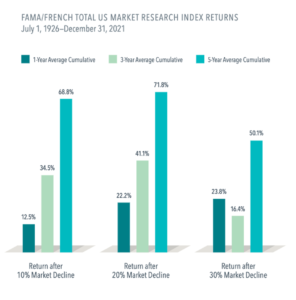We’re sliding into Part 2 of our Realistic Recession Series – and we need to talk about precedence.
It may seem like every bear market gets bigger, hairier, and scarier…
But that’s simply not true.
The U.S. investing market tends to fix problems we know about, which is why we can be nearly certain that another credit crisis borne on the back of mortgage-backed securities that went belly-up will never happen again.
The stock market has always offered investors a robust recovery at an unpredictable time. If you try to ‘time the market’, you run the real risk of missing out on the highest returns in the market.
(Again, stay invested, even during a recession, and you’ll likely be fine. Fool me once, as they say.)
So, why may this looming recession feel different this time? Because news outlets and media publishers want it to feel different.
Did you see the story from BusinessWeek? Likely not, since the story I’m referring to was published in 1979.
The story was entitled “The Death of Equities”, an ominous title, but three years after that article, the stock market started a remarkable resurgence.
The total return on a simple buy-and-hold of the S&P 500 since then has been nearly 11,000% (including reinvested dividends). Not bad for an asset who many believed to be a thing of the past!
The key again is to stay invested, not just to keep losses from becoming permanent, but because stock gains can add up after significant declines in the market.
A broad U.S. market index tracking data shows that since 1926 stocks have tended to deliver positive returns over one-year, three-year, and five-year periods following significant declines.
The cumulative returns show this to an even greater effect. Only five years after market declines of 10%, 20%, and 30%, the cumulative returns all top 50%.
Taking a big-picture annualized perspective, across the longest, five-year period, returns after 10%, 20%, and 30% declines have been close to the historical annualized average over the entire period of 9.8%.

Translation: the biggest gains your portfolio may ever see are most likely to happen after steep declines.
It’s not just recouping lost valuation but also significant growth above the previous value before the decline.
That’s why you don’t have to fear whatever the market may do over this next year.
Staying invested, checking your emotions, and sticking to your personalized written financial plan are the keys to great growth in economic uncertainty.
One action step that can help with this commitment is to stop checking your investment account balances every day.
Instead, consider checking those balances once a quarter to ensure you have a more long-term perspective.
And of course, if you have questions, hit reply to this message and share with our team what’s on your mind.
To your prosperity,
Your Hendershott Wealth Management Team





